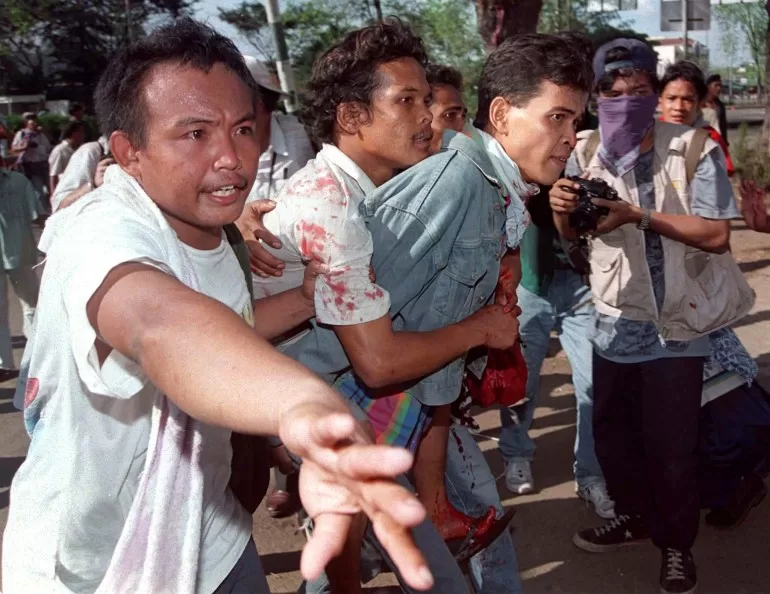The activist played a key role in the student-led protests in 1998 that ended more than 30 years of hardline rule by former Indonesian leader Soeharto and ushered in an era of democratic reform.
But now, Prabowo Subianto, one of Soeharto’s most feared generals and his former son-in-law, looks set to become the Southeast Asian country’s next president.
The former general claimed victory on Wednesday night after unofficial “quick counts” showed he had won more than 50 percent of the vote and was significantly ahead of his two rivals, Anies Baswedan and Ganjar Pranowo.
“If Prabowo is president, it will embolden many people. No one will be scared of committing human rights abuses, because he has avoided all the allegations made against him and managed to cover them up,” Muhammad said, recounting how the Kopassus Special Forces, under Prabowo’s command, cracked down on a protest at Jakarta’s Trisakti University in May 1998.
Four students were killed, and dozens more were wounded.
The incident sparked widespread outrage and following Soeharto’s fall, resulted in Prabowo’s dishonourable discharge from the military.
The former general never faced trial over Trisakti or the 22 abductions that took place during that tumultuous year, although some of his men were tried and convicted. Thirteen activists have never been found.
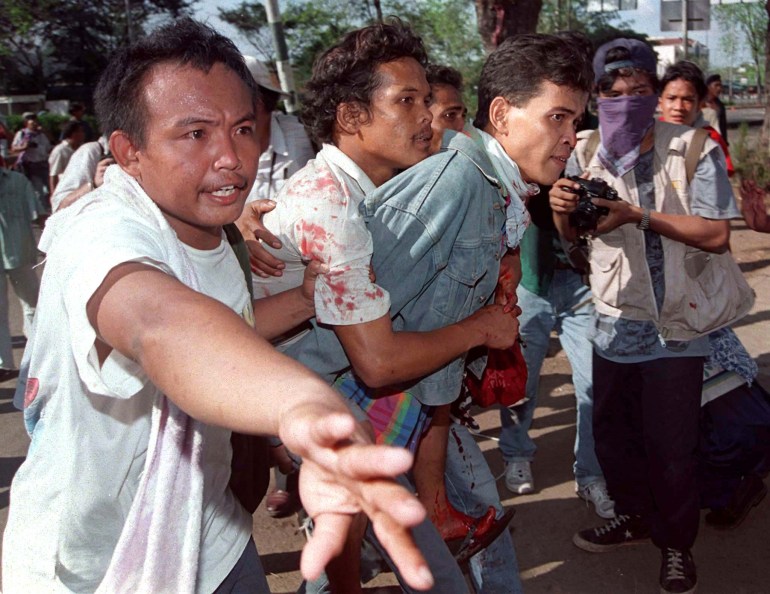
For Muhammad, 72-year-old Prabowo’s probable victory in Wednesday’s election spells perilous times for Indonesia.
“It is so dangerous, and Indonesia will become a very dark democracy with Prabowo in charge,” he told Al Jazeera.
Following orders
Born in 1951 in Jakarta, Prabowo is the son of prominent Indonesian economist Sumitro Djojohadikusumo. He enrolled in the Indonesian Military Academy in 1970 and after graduation, went on to join the elite Kopassus unit of the military.
The general was a close ally of Soeharto, having married the former leader’s daughter Siti Hediati Hariyadi, popularly known as Titiek Soeharto, in 1983. The couple divorced 15 years later.
By May of 1998, when anti-Chinese riots broke out across Indonesia, Prabowo was leading Kopassus.
The riots – which human rights activists say were orchestrated by the military in order to divert attention from public anger against Soeharto amid the Asian Financial Crisis and economic collapse – saw looters burn Chinese-owned businesses and carry out a campaign of terror that included hundreds of killings, beatings and mass rape of ethnic Chinese women.
One female activist, who wished to remain anonymous for fear of reprisal, said many of those carrying out the rapes had been soldiers. “One of the worst cases I handled was a Chinese girl who had been raped with a broken bottle. I am still traumatised by it all these years later,” she said.
Prabowo was widely believed to have been involved in instigating the riots, she said.
The United States imposed a travel ban on Prabowo over the allegations, which was only lifted in 2020 after his appointment as defence minister by outgoing President Joko Widodo, popularly known as Jokowi.
Prabowo has denied involvement in the rights abuses, but in 2014, admitted to Al Jazeera that he had helped abduct activists during the Soeharto era. He said that he had been following orders and that the kidnappings were legal.
“I carried out operations that were legal at the time. If a new government said I was at fault, I was here to take full responsibility,” he said.
In addition to the alleged abuses in Jakarta, Prabowo has also been accused of involvement in military crimes in East Timor, which Indonesia invaded and occupied in 1975, as well as in the eastern province of West Papua, where conflict has been rumbling for decades.
The allegations against Prabowo in East Timor include claims that he led a mission in 1978 to capture Nicolau dos Reis Lobato, the country’s first prime minister who had held the post for just nine days before the Indonesian invasion.
Prabowo was also accused of commanding the special forces team responsible for the so-called Kraras massacre in East Timor in 1983 in which more than 200 people were killed.
The female activist told Al Jazeera that Indonesian soldiers in East Timor were also accused of using “rape as a weapon”.
Prabowo has also denied any wrongdoing in the territory, which finally secured its independence after Soeharto’s fall.
‘Just opinions’
After his expulsion from the military, Prabowo went into business with his brother Hashim Djojohadikusumo and currently owns a number of firms, including paper pulp and plantation companies in East Kalimantan in Indonesian Borneo, as well as oil, gas, coal and palm oil companies.
He was the wealthiest candidate in Wednesday’s election, with reported assets of more than $127m. As well as his mansion on the outskirts of Jakarta, he owns a guarded mountain retreat in Hambalang in West Java, where he rides thoroughbred horses and has a pet falcon.
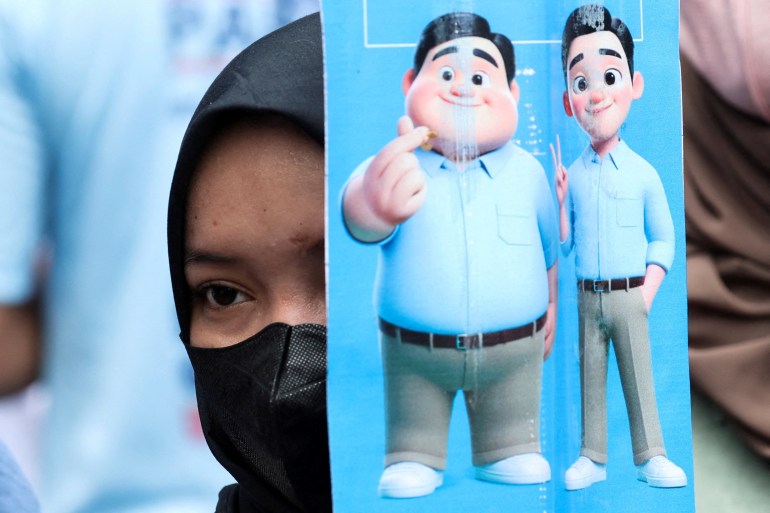
During the presidential campaign, Prabowo sought again to reinvent himself, with his team cultivating an online persona of a “cute” grandfather in a bid to appeal to Indonesia’s younger voters, many of whom are too young to remember the Soeharto era and make up just over 50 percent of the electorate.
The campaign appears to have worked, with several voters telling Al Jazeera they did not believe the allegations against him.
“Opinions about alleged human rights violations committed by Prabowo are just opinions that are always brought up by his rivals in every presidential election to steal the public’s sympathy,” said Bertrand Silverius Sitohang, a lecturer in civic education and law at Santo Thomas Catholic University in Medan in North Sumatra, which was one of the epicentres of the anti-Chinese riots.
“However, what really happened was that none of the legal or disciplinary processes were able to prove that he was the perpetrator of any human rights violations,” added Sitohang, who said he voted for the former general.
Prabowo also benefitted from his association with Jokowi who remains enormously popular with an approval rating of about 80 percent.
The general twice lost the presidency to Jokowi, but after challenging the 2019 results in court, sparking nationwide riots that left nine people dead, he made his peace with Jokowi and joined his cabinet as defence minister.
This time around, he had Jokowi’s eldest son, 36-year-old Gibran Rakabuming Raka, as his running mate, and while the outgoing president did not formally endorse the pair, they were seen to have his implicit support.
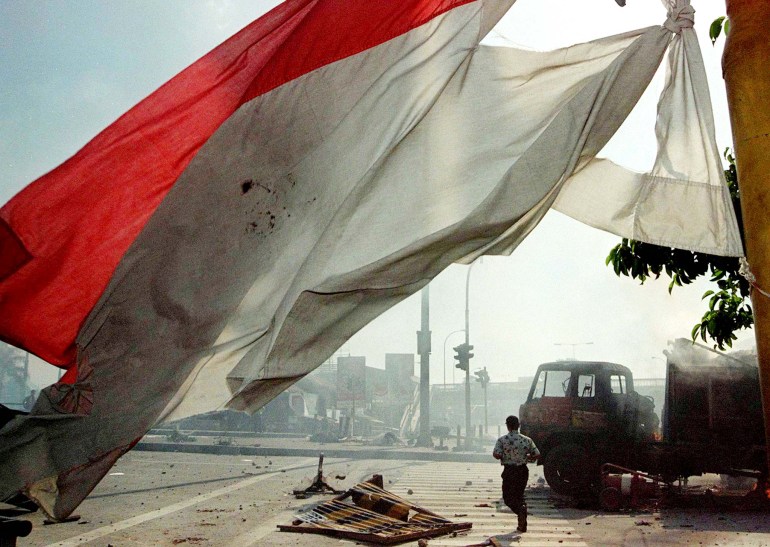
Sahata Manalu, a lawyer in Medan, said it was that Jokowi connection that won Prabowo his vote.
“I am a Jokowi fanatic, so I have to support Jokowi’s political direction. I wanted to vote for Prabowo because he is a good man and a patriot, but the main reason was because of Jokowi,” Manalu said, adding that the human rights violations should have been levelled at Soeharto “because he was the one who gave the orders”.
Meli Nadeak, a domestic helper in Medan, also voted for Prabowo.
For her, it was because the controversial general was “Si Gemoy”, which means “cute” in Indonesia.
Nadeak, who is 25, said that she had watched all of Prabowo’s campaign videos on TikTok and even made some herself to encourage voters to go to the polls and support him.
She said she found his policies appealing too. They include promises to create 19 million jobs over the next five years and provide free school lunches and milk to children and mothers across Indonesia.
“Hopefully, there will not be any human rights violations,” she said.
The official election result is expected by March 20 at the latest, and neither Anies nor Ganjar have yet conceded.
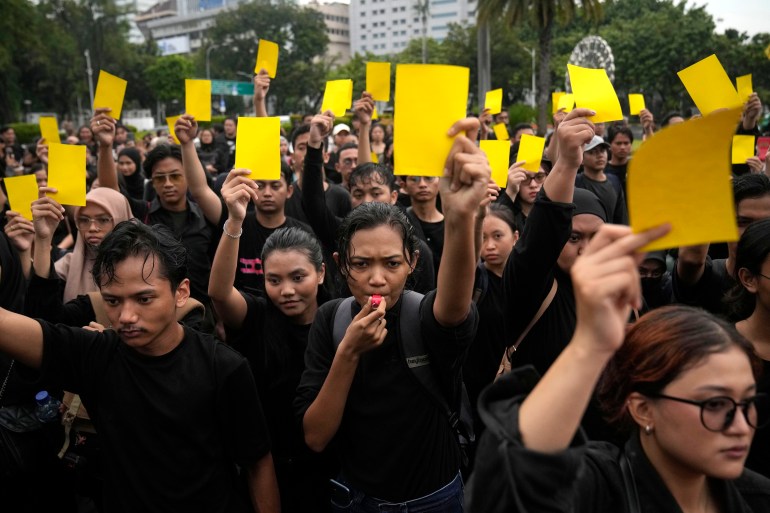
Analysts say while a Prabowo presidency is unlikely to see Indonesia return to full-fledged autocracy, it could further erode the democracy that so many – including Muhammad and his fellow activists – fought for in 1998.
“Prabowo has had an obsession with the presidency since he was in the military and has changed strategy several times over,” Ian Wilson, a lecturer in politics and security studies at Perth’s Murdoch University, told Al Jazeera.
“He will probably not be a fascist dictator in the strict sense, but he is hostile to the democratic process and sees democracy as a means to an end. As president, he will likely do what Jokowi has done and work on how democracy can be more procedural and shrink the space for conversation.”
Prabowo “has never been democratic, and he has never been held to account”, Wilson added.
